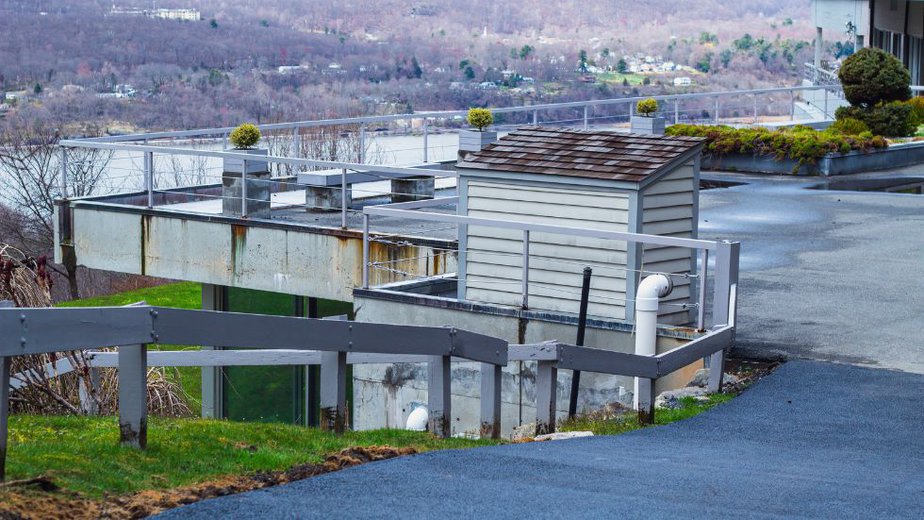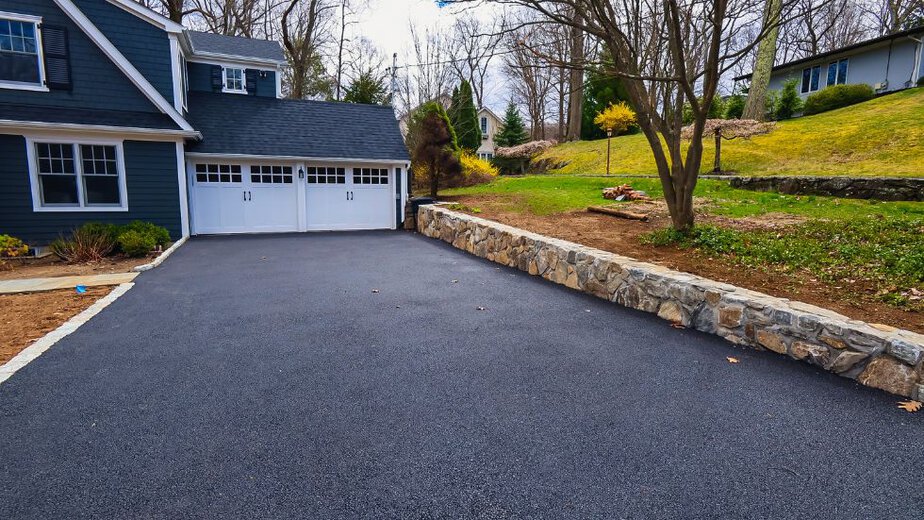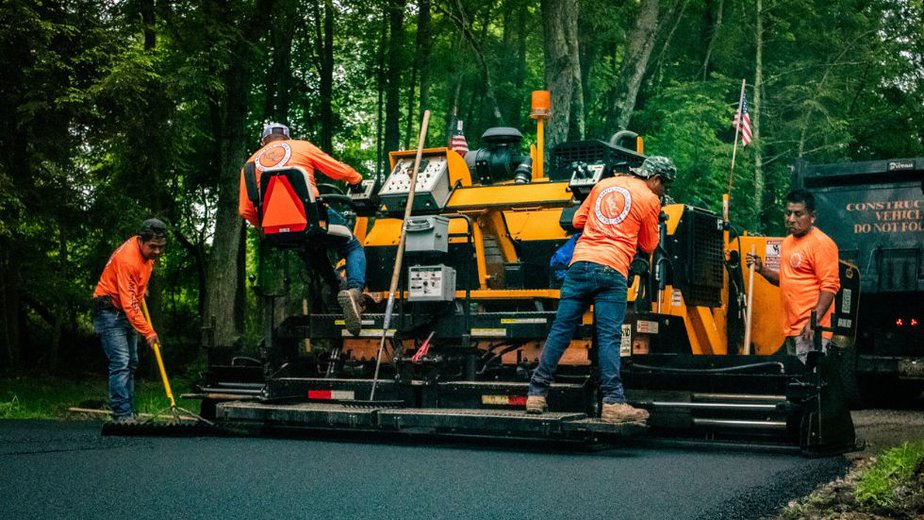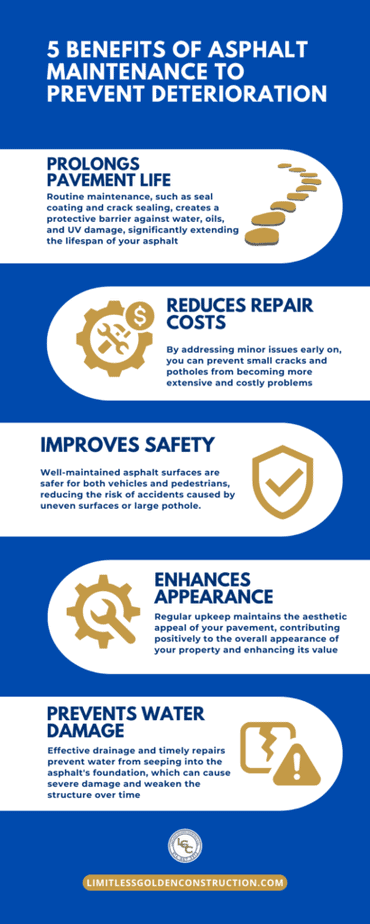Determining how long asphalt lasts is crucial for planning maintenance and budgeting for paving projects. Typically, well-maintained asphalt can last 15–20 years, but various factors can influence its longevity. Understanding these causes of asphalt deterioration helps in adopting preventive measures to extend its lifespan.
Understanding the Lifespan of Your Pavement
When it comes to selecting a material for your driveway, roads, and parking lots, longevity and durability are top of mind, particularly in climates that experience severe weather conditions like those in New York State and Connecticut. Asphalt’s lifespan is a pressing question for those investing considerable amounts into their commercial or private properties.
On average, well-maintained asphalt can last between 15 and 20 years. However, its lifespan can be significantly influenced by a variety of factors including the initial construction quality, environmental conditions, the level, and type of traffic it endures, and the maintenance practices employed.
In the Tri-States’ diverse climate, which can range from hot summers to freezing winters, the care put into both constructing and maintaining asphalt surfaces is even more crucial to ensure they stand the test of time and weather.

Understanding How Long Asphalt Lasts for a Durable Choice for Roads and Driveways
What is Asphalt Used For? From Roads to Parking Lots and More
Asphalt is used in various infrastructural elements due to its resilience and cost-effectiveness. Its use covers a wide spectrum. From providing smoother surfaces on roads to offering a sturdy foundation in parking lots, driveways, and airport runways. In a bustling states like New York and Connecticut, where the infrastructure plays a pivotal role in everyday life, choosing the correct material for paving is paramount.
Asphalt Pavements: Understanding Materials and Construction
The longevity of asphalt greatly depends on the materials used and the construction process. Asphalt pavements typically consist of a mixture of small stones or sand and liquid asphalt cement. The proportions and the quality of these components contribute significantly to the pavement’s durability. The structure of the layered construction also impacts its longevity, from the subgrade and base to the surface layer.
When asphalt is laid down, the correct compaction of these layers is essential to prevent future damage. Properly compacted layers will result in fewer spaces for water to enter and freeze, a considerable benefit when dealing with New York’s or Connecticut’s harsh winters.
For more detailed information about the materials and construction we use at LGC, feel free to contact us today.
The Common Causes of Asphalt Deterioration
When considering how long does asphalt last, it’s essential to recognize that even the most durable materials are subject to wear and tear over time. Asphalt deterioration can result from a mix of environmental conditions, usage patterns, and maintenance practices. Identifying these common causes is the first step in extending the lifespan of your pavement.
Environmental Factors
The environment plays a key role in the aging of asphalt pavements. Changes in temperature cause asphalt to expand and contract, which can lead to cracking. In winter, moisture seeps into these cracks and freezes, further expanding the asphalt and causing additional damage, a process known as frost heave.
UV radiation from the sun can also affect the asphalt negatively by breaking down the chemical bonds in asphalt cement. This deterioration leads to fading, making the asphalt brittle and more susceptible to other forms of damage.

Traffic Load
The sheer amount of stress placed upon asphalt by traffic (especially heavy and constant vehicle presence) can cause rutting, depressions, and eventually lead to structural failure if not addressed.
Water Damage
Proper drainage is crucial. Standing water from poor drainage can infiltrate the base layer, weakening the foundation and leading to potholes and other issues. Water is the enemy of long-lasting asphalt and must be planned for, both in initial construction and maintenance.
The Importance of Maintenance
Routine maintenance can mitigate many of these issues and extend the life of the pavement. Sealcoating, for example, provides a protective layer against UV rays and water, while also refreshing the look of older asphalt. Crack-filling is just as important to keep moisture out of the base layers.
Do you need to refresh your asphalt? Request your free quote today and prevent these common causes from ruining your asphalt.

Signs of Trouble: Identifying Asphalt Deterioration
Identifying early signs of wear and tear can be crucial in extending the lifespan of your asphalt driveway or parking lot. Key indicators not only highlight the current state of deterioration but also offer insight into potential underlying issues that need immediate attention. Early detection followed by prompt repair can save significant costs and prevent minor problems from escalating into major repairs.
What Cracks in Asphalt Should I Look Out for in Driveways?
Cracks in asphalt can vary significantly, each type indicating a specific underlying issue. Regular inspection helps identify these early, allowing for timely maintenance interventions.
Potholes
Potholes are not just a driving nuisance; they are clear indicators of asphalt failure. Formed by the expansion and contraction of water after it has entered into the ground under the pavement, potholes worsen with traffic wear and can indicate severe deterioration that requires immediate attention.
Raveling
Raveling occurs when the asphalt begins to separate from the binder, leading to a rough surface texture and the eventual loss of pavement thickness. This deterioration is often a result of aging, poor initial construction quality, or environmental factors.
Alligator Cracking
Alligator cracking, named for its resemblance to alligator skin, is a series of interconnecting cracks that usually indicate structural failure under the asphalt surface. This type of cracking suggests that the area has been compromised by significant stress or water infiltration, necessitating thorough examination and repair.
Wondering how long does will your asphalt last? Contact us for a detailed assessment and ensure your pavement stands the test of time. Reach out now to schedule a consultation with our experts.

Extending Asphalt’s Life: Maintenance and Repair Strategies
Proper maintenance and repair are key to extending the lifespan of asphalt surfaces, ensuring they remain functional and aesthetically pleasing. Regular upkeep not only prevents minor issues from becoming major problems but also contributes to the overall safety and usability of roads and driveways. With a combination of proactive measures and timely interventions, property owners can significantly prolong the life of their asphalt surfaces.
How to Fix Cracks in Asphalt Driveway: Sealing and Patching Techniques
Fixing cracks in an asphalt driveway is crucial to prevent water infiltration that could lead to further damage. Small, hairline cracks can often be sealed with liquid crack fillers that are readily available at home improvement stores. For larger cracks, a patching compound may be necessary to provide a more resilient repair. The process involves cleaning out the cracks, applying the filler or compound, and ensuring a smooth, level finish. Regular sealing of the entire driveway can also protect the asphalt surface from UV rays, water, and chemical damage, further extending its life.
When to Call a Professional: Addressing Major Asphalt Damage
While small cracks and minor deterioration can typically be handled as DIY projects, significant damage requires professional attention. This includes deep or widespread alligator cracking, large potholes, or any issue that affects the structural integrity of the pavement. Professional asphalt repair companies like LGC have the expertise, equipment, and materials to diagnose and effectively repair major damage. We can also offer advice on preventive maintenance measures to avoid future problems. In cases of severe deterioration, resurfacing or complete replacement may be the most cost-effective solution to ensure the safety and functionality of the pavement.
Get Professional Help Today
The lifespan of your asphalt pavement will depend heavily upon initial construction practices, local environmental conditions, the type, and amount of traffic, and the commitment to ongoing maintenance. It’s important for property owners to invest both in quality construction and in a regular maintenance schedule to maximize the return on their asphalt investment.
For those in commercial and private properties, understanding these factors ensures you can make informed decisions about the materials and maintenance programs you choose to protect your infrastructure investments in the face of New York’s and Connecticut’s challenging climate.
Remember, a proactive approach to asphalt care is the key to prolonging its life, maintaining its aesthetics, and ultimately, saving money in the long run. Request your free quote!


